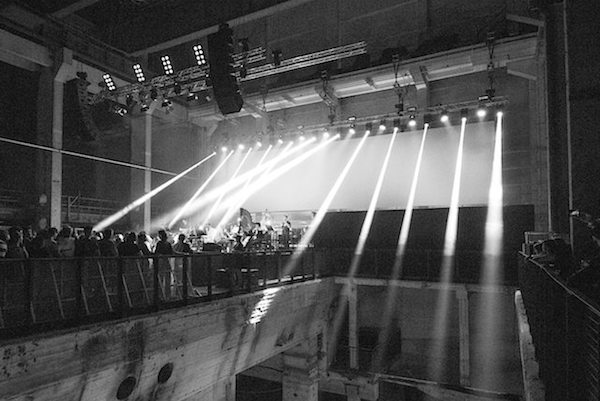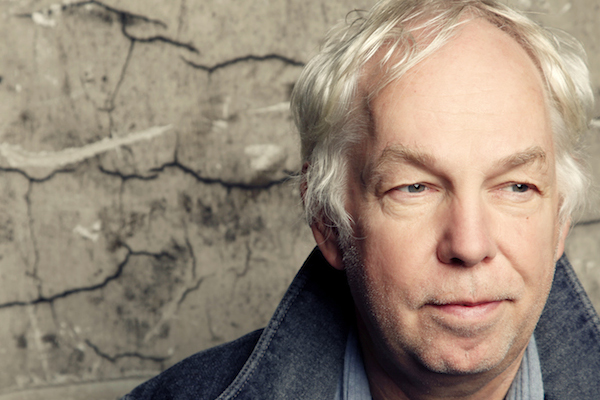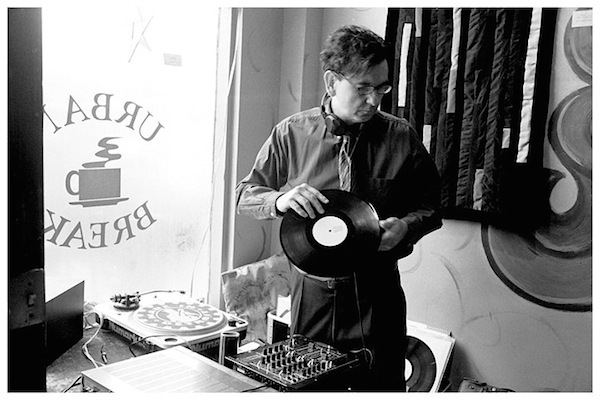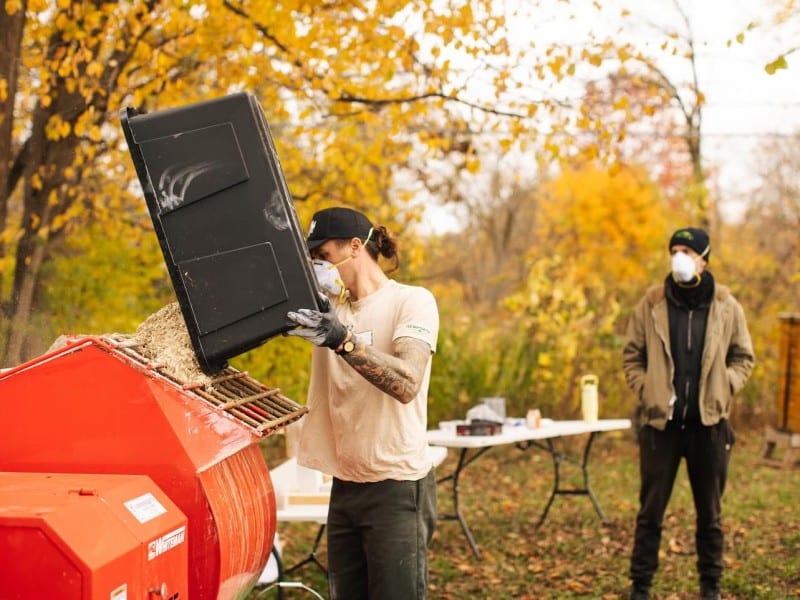Berlin, Detroit, and reinvention through “creative industries”: A conversation with Dimitri Hegemann
Hegemann, a Berliner who is in town for a the Detroit-Berlin Connection, a conference coinciding with the Movement Festival, shares with Walter Wasacz his thoughts on how music and creative industries can spur economic growth in cities.
I first met Dimitri Hegemann last September when we talked over Skype for a feature in XLR8R magazine. The story was about his 22-year-old business called Tresor, a legendary techno label and dance club, which was seeing a resurgence after a few lean years.
Two months later we met again in Detroit. He was here introducing himself and his work to Detroiters who did not know what he and other “techno entrepreneurs” had done to help revitalize a city physically torn asunder by Allied bombs in WWII, then fractured and frayed through 45 years of Cold War.
The fall of the Berlin Wall in 1989 resulted in a decade’s worth of sustained euphoria, inspired by “the New Dance Sound of Detroit.”
Hegemann is back in Detroit this week to lead a conference called the Detroit-Berlin Connection happening May 23 at the Museum of Contemporary Art Detroit (MOCAD). Get more details about the conference here. We’ve been talking every week for five months. This interview is a product of those conversations.
Walter Wasacz: You’ve been in Berlin since the late 1970s. Describe briefly what it was like to be in West Berlin in the 1970s and 1980s; and tell us about some of your projects (and artists) you worked with.
Dimitri Hegemann: I grew up in a small village. I lived a happy and quiet life there and didn’t want to leave. But, influenced by the spirit of the hippie movement, events like Woodstock and music like Jimi Hendrix, I had a new vision of the way I wanted to live. When I tried to realize these visions by founding a new community in the ruins of an old castle, the conservative elements of the town told me to leave.
Then I made it to West Berlin, where I met young people with similar stories to mine. West Berlin presented us with more opportunities. The air was thick with politics: riots, permanent debates about everything, heightened consciousness. Looking back, I was overwhelmed in those years.
I heard sounds which were completely new, played by groups with strange names: “Collapsing New Buildings” (Einstürzende Neubauten), Sprung aus den Wolken, and the all-female band Malaria. I was like ‘Curious George,’ but also proud to belong to this strange and strong community of artists, thinkers, and interesting people. I studied musicology at the Berlin Free University and in 1982 organized the first Berlin Atonal festival – a place for new methods in sight and sound, intended to break lazy listening habits which had become boring and conservative.
The festival was successful and I continued with international groups in the following years: Psychic TV, Test Department, Laibach, Clock DVA, 808 State, Final Cut and many more. I put on performances and screened surrealist movies. The Berliners were open (to it) and ate it up. I was always interested in new trends in listening and experimental music.
In 1986, I opened a Dada inspired club called The FischBuero (all the legal stuff was registered to Mrs. Fisch, who was just a ghost and never existed in reality). Fisch pushed us outwards in all directions. The content always had a funny element, was always combined with humor.
There had always been open-minded people living in Berlin who believed strongly in alternative living formats and expressions of culture. Their major problem was space — finding the appropriate places to live out these new visions. This changed overnight with the collapse of the Wall.
How did things change in the early 1990s, after the fall of the Wall and reunification of the city?
Firstly, a euphoria descended. A positive atmosphere set in. The authorities were so busy with other problems that they had no time to control or prevent subcultural activity. This was the unique historical moment for everybody in Berlin (East and West) to realize his or her visions for alternative life styles. This moment extended almost four years. There was basically no control.
Today, the results of this period are still felt. Berlin is probably the most loved city in the world. The resulting subculture of West Berlin is now called the “creative industries.” More than 65 percent of visitors to the city come because of the alternative cultural program that is associated with Berlin and its history. These visitors stimulate this program and help create a friendly, liberal spirit in the city.
When did you discover Detroit techno and how much did it affect the social and cultural vibe in Berlin?
I discovered techno at Wax Trax! Records (in Chicago). I was there to license music by (British industrial band) Clock DVA. I found a white label by the Detroit project called Final Cut. I saw this handwritten phone number on the label starting with 313… so I called them and later released their album in Germany. I invited them to play the Berlin Atonal festival in 1990. One of the members was, of course, Jeff Mills. We stayed in touch and one year later things changed. With friends we started the Tresor Club in an old vault in the heart of Berlin and a record label with the same name. Jeff Mills started UR (Underground Resistance) with Mike Banks and Rob Hood.
Our first 12-inch release was “Sonic Destroyer” by Jeff, Mike, and Rob. It became a smash in Berlin, then worldwide, and this classic track opened the techno alliance between Berlin and Detroit. The inspiration of Detroit techno has influenced the entire electronic techno community. It would be fair to say that Detroit techno has caused the biggest youth movement of the last century. I still cannot understand why this cultural format did not receive the attention in Detroit it deserved. The success and public reception of the techno movement in Berlin was also a door opener for different genres, from fashion to art. The time has come to give something back to Detroit.
What was your motivation to start Tresor, the club and the label? What year did you launch?
In March 1991 we started the club. The main reason was to establish a serious platform for all the artists we released on our label. The timing was perfect: right moment, right spot, right content.

Your relationship to Detroit artists continued to grow at this time as well, correct? Who are your closest Detroit connections?
Among many, many others, I must single out UR. Mike Banks and his hard working team have encouraged me again and again. There is fantastic music coming from many different quarters in Detroit, but the philosophy of UR — their political position against ‘cultural programming’ — has touched me especially. Mike Banks is just one person in the scene, but he works like an orientation point for outsiders interested in the history and spirit of Detroit techno. He is symbolic of the true spirit that techno needs so much, especially when you see that techno could achieve more than it does at the moment.
All the things made possible by techno could flow back into Detroit and help the city. The reason why I want to come with 15 Berliners — each with practical, concrete, achievable projects — is to give Detroit an idea of what this might look like. In Berlin, Detroit is known as the Techno City. That’s a fact. It’s time Berlin gave something back and I hope this action will be the starting point for a host of cooperations and transfers in the future.
Tell us how Berlin was changing in the late 1990s and early 2000s. The art and music scenes were growing, young people began to head to Berlin for parties, then many others began to move there to live. Share some observations about why and how this happened.
Of course Berlin has changed over the years. Any place that has dynamism, experimentalism, and energy built into it is going to change. If anything, the more recent changes have to do with a new internationalism. It is fair to say that Berlin now is the world capital of a global movement. It is hard to say exactly what that movement is — in fact it is many different movements that each have some sort of family resemblance. The common threads would be: openness, adventurousness, liberalism, experimentalism, community, and, holding these all together, music and art.
When did the Happy Locals come together? How many groups are working collaboratively to sustain positive vibes and momentum in the city?
The Happy Locals are a group of Berlin based organizations who help realize alternative projects. It was initiated in 2012 by Annette Ochs and I. The main aim is this: to share the experience and knowledge of setting up projects with interested people and to find collaborators and partners to plan creative projects. The Happy Locals want to push forward this experience, knowledge and creativity across borders and genres.
I strongly believe that the transfer of know-how can seriously bring about positive changes in new places. The stimuli of advice and experience can be crucial, and even a handful of interesting, involved projects can change a place permanently for the better. Even in Berlin a few main attractions bring tens of thousands of young people to the city every week — even the fact that they can’t all fit doesn’t bother them, and they look to find and support other spots.
The conference organized by the Happy Locals should allow us to explore and develop real, actual, concrete possibilities for the city.
The participants prove the point: re:publica is happening currently in Berlin and is being talked about everywhere as pointing the way to new forms of community and development within new media. Why can’t this be happening in Detroit?
The same questions could be asked with regard to WOMEX or Classical:Next. The Club Commission also represents a success story — associations of venues that further the interest of music and subcultural activity within the city. The Musicboard, too. It’s a government agency that administers 1.5 Million Euros for interesting, new, and alternative music forms and platforms. They believe that every dollar spent will create $4 in return, and the results confirm this. Every festival, event, musician, or group supported by Musicboard contributes directly back into the city in a multiplicity of direct and indirect ways.
The Happy Locals are like a consulting group that facilitates these knowledge transfers. But it’s not a one-way street. The aim is also to listen. To hear what Detroit has to say, to learn from what is happening on the ground there, and feed that back into positive advice, suggestions, possibilities, and, hopefully, real projects.
What have you learned over the past 25 years of entrepreneurship and innovation that you can pass on to Detroiters?
This is my experience: give the young people space for their experiments and support them. I would ask Gov. Snyder to say ‘Yes’ to them, to encourage them. Because they will return everything they are given back to the city. Every city needs cultural development, and it is the city’s responsibility to coach the energetic youth to make this in the right, positive way. The key is diversity, supporting all expressions of art on every level.
Walter Wasacz is former managing editor of Model D and continues to write and do special projects for the publication and its parent Issue Media Group. He will moderate the panel discussion at the Detroit-Berlin Connection event May 23 at MOCAD.






